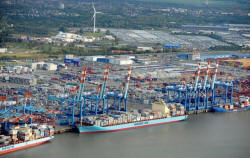|
 German
fourth-quarter growth steady but unspectacular as
foreign trade drags German
fourth-quarter growth steady but unspectacular as
foreign trade drags
 Send a link to a friend
Send a link to a friend
[February 12, 2016]
By Caroline Copley
BERLIN (Reuters) - Germany posted steady
economic growth in the final quarter of 2015, as higher state spending
boosted by the refugee crisis and significantly more construction offset
a drag from foreign trade, the Federal Statistics Office said on Friday.
|
|
 The economy grew by 0.3 percent in the final three months of 2015,
in line with the consensus forecast in a Reuters poll and at the
same rate as in the previous quarter. The economy grew by 0.3 percent in the final three months of 2015,
in line with the consensus forecast in a Reuters poll and at the
same rate as in the previous quarter.
The overall growth rate for 2015 was 1.7 percent.
Unadjusted data showed the economy expanded by 2.1 percent on the
year in the fourth quarter, falling short of the consensus forecast
for 2.3 percent growth.
"Slow but steady was the retrospective motto for 2015," said VP Bank
Group Chief Economist Thomas Gitzel, describing fourth quarter
growth as "not exhilarating" but also not a reason to worry.
The statistics office said more was invested in construction
compared to the previous quarter while foreign trade acted as a
brake on growth.

After a solid first half of 2015, the economy slowed slightly in the
second half as market turmoil in emerging markets and the Chinese
slowdown left their mark.
The steady reading follows on from surprisingly poor industrial
output data for December that underlined the challenges facing
Germany's traditionally export-driven economy this year after the
slowdown in emerging markets.
CONSUMERS
Private consumption has overtaken trade as the most important growth
driver for the German economy, with record-low unemployment, low
interest rates and higher wages loosening consumers' purse strings.

[to top of second column] |

While state spending rose significantly in the final three months of
the year, private consumption increased only slightly.
A slump in the European financial sector that has hammered shares
this week in Deutsche Bank <DBKGn.DE>, Germany's biggest lender, has
raised concerns that market volatility may spill over into the real
economy.
ING economist Carsten Brzeski said 2016 could prove more challenging
for the German economy due to the refugee crisis, political
uncertainty and increasing external headwinds.
"On top of the well-known risk factors like slowing China and
emerging markets or a still struggling eurozone, low oil prices and
the possible weakness of the U.S. economy could give the German
economy a hard time," he said.
The German government last month revised down its growth forecast
for 2016 to 1.7 percent.
(Additional reporting by Joseph Nasr; Editing by Gareth Jones)
[© 2016 Thomson Reuters. All rights
reserved.] Copyright 2016 Reuters. All rights reserved. This material may not be published,
broadcast, rewritten or redistributed.
 |